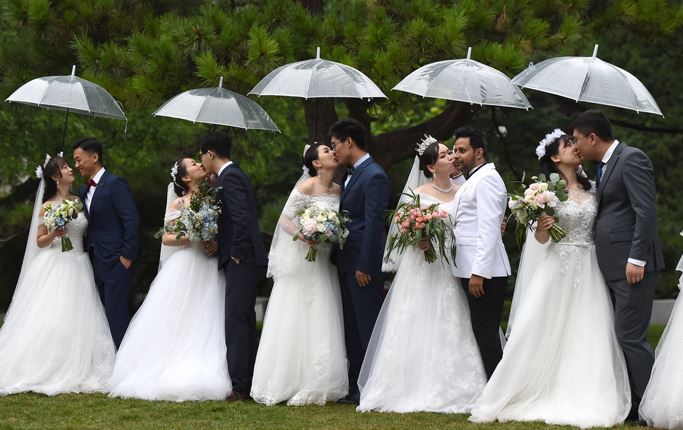
From the People's Daily app.
And this is Story in the Story.
It seems that most younger Chinese are very much against the idea of arranged marriages, at least if a new survey on the matter is anything to go by.
The survey, released by China Youth Daily, shows that more than 61 percent of Chinese young people oppose arranged marriage, expecting their parents to only give suggestions when finding a spouse.
The survey found that the most unacceptable parental interference among young Chinese is parents attending a blind date in place of their children, making up to 45 percent.
The second most offensive interference was parents joining their child on a blind date, accounting for 25.1 percent of those surveyed.
Today's Story in the Story looks at the change in the ways younger people now see marriage in China as opposed to how their parents see it.

Couples attend a group wedding on campus at the Beijing Institute of Technology in Beijing, on June 16, 2019. (Photo: IC)
In that same survey, about 57 percent of the respondents said they hope that instead of imposing ideas on their children, parents should learn more about what their children want, which covered 1,953 unmarried young people.
"I don't like that parents control the whole process of my marriage as well as the blind dates," said Lin Peng, from Nanchang, Jiangxi province. "I hope I can have more freedom."
According to Ling Zi, a marriage consultant from Hangzhou, East China's Zhejiang province, it does more harm than good for parents to be overly involved in children's marriages. "It shows the distrust of the parents, and transfers their anxiety to their children," said Ling.
It has become common in China for pushy parents to look for spouses for their children who are too busy or slow in finding love, the paper said.
In line with that, another survey by the China Youth Daily showed that around half of the respondents could accept a "bare-bones marriage," or getting married without any major assets or a grand wedding ceremony.
Among the 2,004 respondents, 64.5 percent regarded a "bare-bones marriage" as getting married without an apartment, 56.4 percent without a wedding ceremony, and 54.2 percent without a car.
The vote revealed that 48.3 percent of the respondents said they could accept a "bare-bones marriage," 20.5 percent opposed it, and 92.8 percent had relatives or friends who had a "bare-bones marriage."
Some 63.5 percent of those surveyed attributed a "bare-bones marriage" to saving money, 58.8 percent to poor financial conditions, and 51.7 percent thought the couples prefer to go on trips or shopping rather than spend money on an expensive wedding ceremony.
About 53.1 percent of the respondents believed a frugal "bare-bones marriage" could change the extravagance of traditional wedding ceremonies, and 44.4 percent saw it as a positive trend compared to traditional wedding customs.
The survey also showed that 54.6 percent of the respondents believed rituals were necessary for a marriage.
Chinese brides pose for photographs during the mass wedding ceremony for fifty Chinese couples in Colombo, Sri Lanka Dec 17, 2017. (Photo: VCG)
But Ling did not think so, adding that nowadays, many wedding ceremonies are similar and not memorable.
The whole idea of marriage in China is quite different now to what it once was and that could have a lot to do with the old saying in China – “There are men, women, and female PhD holders."
It's a sexist joke that assumes Chinese women with advanced degrees intimidate men or have standards that are too high. If they remain single for many years, they're labeled "leftover women."
The term, which emerged around 2006, refers to both men and women over a certain age who are not in committed relationships. Society has often found their single status unacceptable, especially their parents' generation for whom marriages were often arranged.
Yet, the phenomenon of increasing numbers of single adults is obviously more complicated than young people simply being too choosy.
High living costs keep many people from starting families. "Matchmaking corners" – organized for young people to find dates – are now more frequented by parents who desperately promote their children's biographies like salespeople.
But their parents' enthusiasm has not kept young people from valuing spiritual connections over material wealth.
This is exactly why many are not in a hurry to marry. Instead of starting a family at an early age, young people now prefer to give themselves more time to prepare themselves – which will also help them find perfect partners.
To them, finding a husband or wife is more than a mission to reproduce; it is a choice about how to spend the rest of their lives.
(Produced by Nancy Yan Xu, Brian Lowe, Lance Crayon and Chelle Wenqian Zeng. Music by: bensound.com. Text from China Daily and CGTN.)


